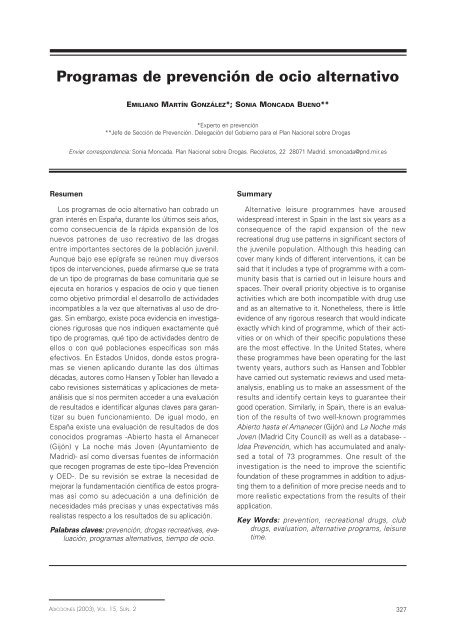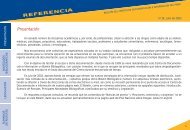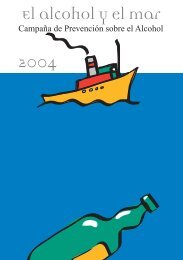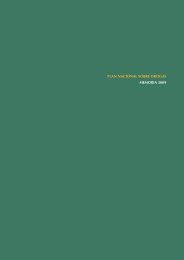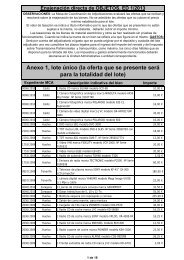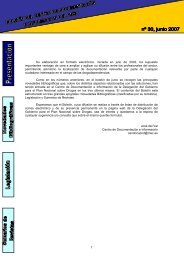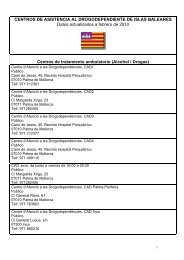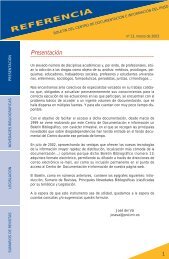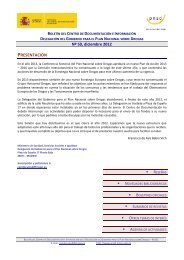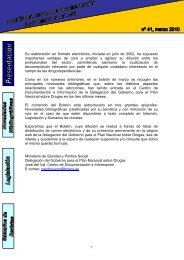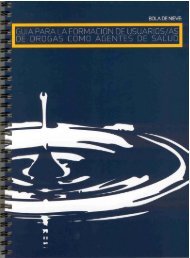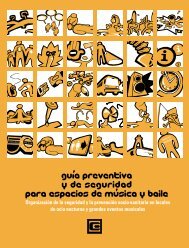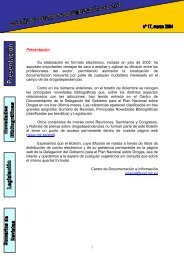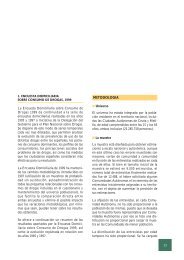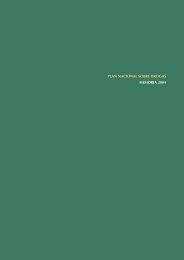162/91 ALCOHOL monograf.a - Plan Nacional sobre drogas
162/91 ALCOHOL monograf.a - Plan Nacional sobre drogas
162/91 ALCOHOL monograf.a - Plan Nacional sobre drogas
Create successful ePaper yourself
Turn your PDF publications into a flip-book with our unique Google optimized e-Paper software.
Programas de prevención de ocio alternativo<br />
EMILIANO MARTÍN GONZÁLEZ*; SONIA MONCADA BUENO**<br />
*Experto en prevención<br />
**Jefe de Sección de Prevención. Delegación del Gobierno para el <strong>Plan</strong> <strong>Nacional</strong> <strong>sobre</strong> Drogas<br />
Enviar correspondencia: Sonia Moncada. <strong>Plan</strong> <strong>Nacional</strong> <strong>sobre</strong> Drogas. Recoletos, 22 28071 Madrid. smoncada@pnd.mir.es<br />
Resumen<br />
Los programas de ocio alternativo han cobrado un<br />
gran interés en España, durante los últimos seis años,<br />
como consecuencia de la rápida expansión de los<br />
nuevos patrones de uso recreativo de las <strong>drogas</strong><br />
entre importantes sectores de la población juvenil.<br />
Aunque bajo ese epígrafe se reúnen muy diversos<br />
tipos de intervenciones, puede afirmarse que se trata<br />
de un tipo de programas de base comunitaria que se<br />
ejecuta en horarios y espacios de ocio y que tienen<br />
como objetivo primordial el desarrollo de actividades<br />
incompatibles a la vez que alternativas al uso de <strong>drogas</strong>.<br />
Sin embargo, existe poca evidencia en investigaciones<br />
rigurosas que nos indiquen exactamente qué<br />
tipo de programas, qué tipo de actividades dentro de<br />
ellos o con qué poblaciones específicas son más<br />
efectivos. En Estados Unidos, donde estos programas<br />
se vienen aplicando durante las dos últimas<br />
décadas, autores como Hansen y Tobler han llevado a<br />
cabo revisiones sistemáticas y aplicaciones de metaanálisis<br />
que sí nos permiten acceder a una evaluación<br />
de resultados e identificar algunas claves para garantizar<br />
su buen funcionamiento. De igual modo, en<br />
España existe una evaluación de resultados de dos<br />
conocidos programas -Abierto hasta el Amanecer<br />
(Gijón) y La noche más Joven (Ayuntamiento de<br />
Madrid)- así como diversas fuentes de información<br />
que recogen programas de este tipo–Idea Prevención<br />
y OED-. De su revisión se extrae la necesidad de<br />
mejorar la fundamentación científica de estos programas<br />
así como su adecuación a una definición de<br />
necesidades más precisas y unas expectativas más<br />
realistas respecto a los resultados de su aplicación.<br />
Palabras claves: prevención, <strong>drogas</strong> recreativas, evaluación,<br />
programas alternativos, tiempo de ocio.<br />
Summary<br />
Alternative leisure programmes have aroused<br />
widespread interest in Spain in the last six years as a<br />
consequence of the rapid expansion of the new<br />
recreational drug use patterns in significant sectors of<br />
the juvenile population. Although this heading can<br />
cover many kinds of different interventions, it can be<br />
said that it includes a type of programme with a community<br />
basis that is carried out in leisure hours and<br />
spaces. Their overall priority objective is to organise<br />
activities which are both incompatible with drug use<br />
and as an alternative to it. Nonetheless, there is little<br />
evidence of any rigorous research that would indicate<br />
exactly which kind of programme, which of their activities<br />
or on which of their specific populations these<br />
are the most effective. In the United States, where<br />
these programmes have been operating for the last<br />
twenty years, authors such as Hansen and Tobbler<br />
have carried out systematic reviews and used metaanalysis,<br />
enabling us to make an assessment of the<br />
results and identify certain keys to guarantee their<br />
good operation. Similarly, in Spain, there is an evaluation<br />
of the results of two well-known programmes<br />
Abierto hasta el Amanecer (Gijón) and La Noche más<br />
Joven (Madrid City Council) as well as a database- -<br />
Idea Prevención, which has accumulated and analysed<br />
a total of 73 programmes. One result of the<br />
investigation is the need to improve the scientific<br />
foundation of these programmes in addition to adjusting<br />
them to a definition of more precise needs and to<br />
more realistic expectations from the results of their<br />
application.<br />
Key Words: prevention, recreational drugs, club<br />
drugs, evaluation, alternative programs, leisure<br />
time.<br />
ADICCIONES (2003), VOL. 15, SUPL. 2<br />
327


